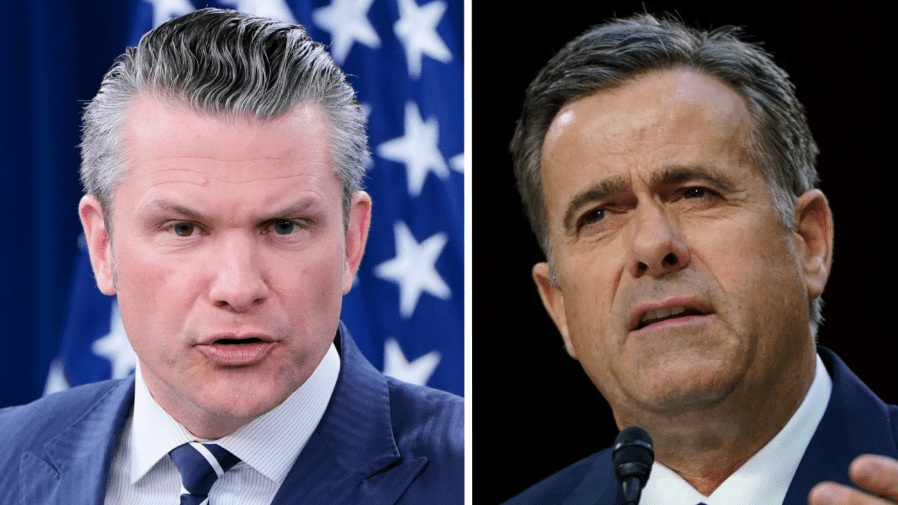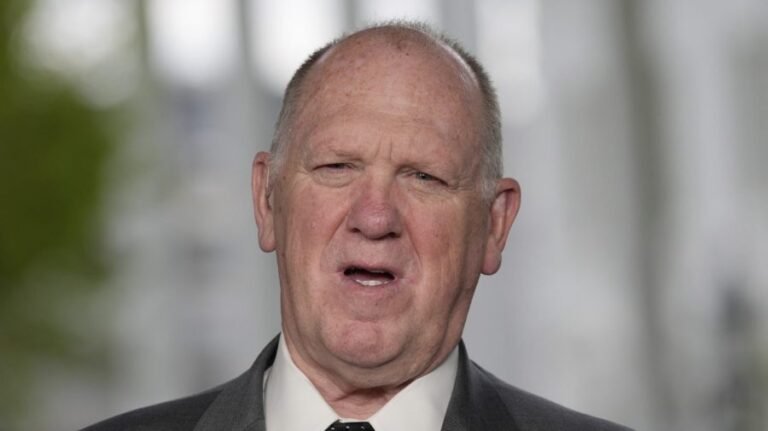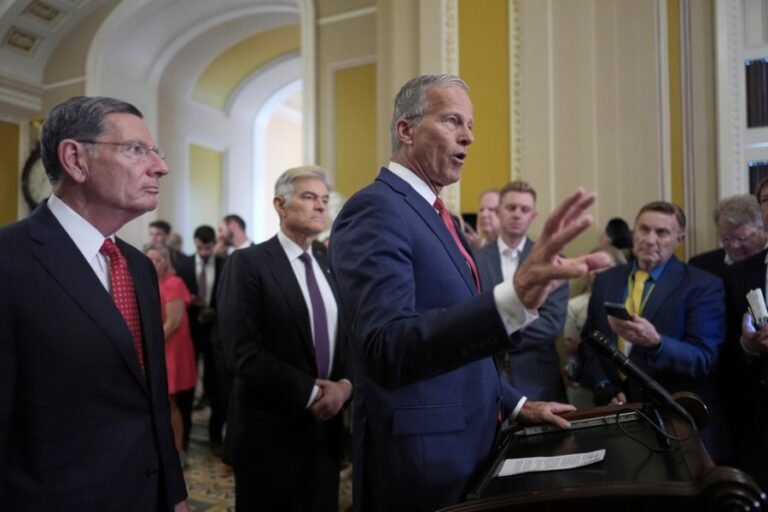
The White House is scrambling to address growing questions about its military strikes on Iranian nuclear sites, as President Trump and top officials insist the decision to bomb facilities has significantly set back Tehran’s nuclear efforts.
The Trump administration today will dispatch CIA Director John Ratcliffe and other officials to Capitol Hill to brief senators while Defense Secretary Pete Hegseth plans to hold a Pentagon news conference this morning “in order to fight for the Dignity of our Great American Pilots,” Trump said.
The president took a shot at media coverage of the Iran strikes while touting Hegseth’s appearance on Truth Social, promising it “will prove both interesting and irrefutable.”
▪ The Hill: Trump fights to hold on to narrative of Iran win
▪ The Hill: Questions around success of Iran strikes spark fears on Capitol Hill
Ahead of his Hill visit, Ratcliffe reinforced Trump’s statements that U.S. bunker-buster bombs dropped on multiple Iranian nuclear enrichment facilities effectively ended Tehran’s nuclear weapons program.
“New intelligence from an historically reliable and accurate source/method” found that “several key Iranian nuclear facilities were destroyed and would have to be rebuilt over the course of years,” Ratcliffe said in a statement.
The CIA chief, a former member of Congress, is updating lawmakers after the administration postponed planned briefings Tuesday.
Trump said during a news conference in the Netherlands at the NATO Summit on Wednesday that Iran did not remove its near-weapons-grade uranium before the U.S. bombings. He said uranium is now buried beneath “granite, concrete and steel” under Iran’s blackened facilities.
“We think we hit them so hard and so fast, they didn’t get to move [it],” the president added. “We think we got it.”
Vice President Vance and Hegseth have also described the uranium as buried.
▪ The Hill: Trump, Hegseth scoff at Iran damage assessment; leak probe underway.
▪ The New York Times: Secretary of State Marco Rubio fleshes out Trump’s case that Iran’s nuclear capacity was eliminated.
As it escalates its public defense of the strikes, the administration says it will also impose new limits on intelligence sharing with Congress after the president lambasted media outlets that reported preliminary findings from a Defense Intelligence Agency (DIA) damage assessment.
Trump said information reported by news outlets was inconclusive and overtaken by additional intelligence, including from Israel.
Democratic lawmakers, including Senate Minority Leader Chuck Schumer (D-N.Y.) and House Intelligence Committee ranking member Rep. Jim Himes (D-Conn.), urged the administration to reconsider any information blackouts.
“The law requires the congressional intelligence committees to be kept fully and currently informed, and I expect the Intelligence Community to comply with the law,” Himes said.
Trump pointed to a statement from the Israeli Atomic Energy Commission that the strikes “rendered the enrichment facility inoperable.” The statement was distributed by the White House and the office of Israeli Prime Minister Benjamin Netanyahu.
“The American strikes on Iran’s nuclear facilities, combined with Israeli strikes on other parts of Iran’s military nuclear program, have set back Iran’s ability to develop nuclear weapons by many years,” the statement said.
Iranian Foreign Ministry spokesperson Esmail Baghaei told Al Jazeera, “Our nuclear installations have been badly damaged, that’s for sure.”
Director of National Intelligence Tulsi Gabbard, recently rebuffed by Trump, said Wednesday that “new intelligence” confirmed the Iranian nuclear facilities were destroyed.
The president said he doubts Iran would seek to rebuild its nuclear program, but if it tried, he suggested the regime would need years.
Trump also expressed confidence the U.S.-brokered ceasefire between Israel and Iran can hold. “I think the war ended, actually, when we hit the various nuclear sites with planes,” he told reporters.
A majority of Americans, 56 percent, said they disapproved of the U.S. strikes in Iran, according to a CBS News/YouGov survey this week. The administration’s messaging has emphasized U.S. military prowess and assertions that Trump attained his goal to prevent Iran from possessing a nuclear weapon.
SMART TAKE with BLAKE BURMAN
The Trump administration is continuing to defend the success of Operation Midnight Hammer, which includes the CIA Director John Ratcliffe releasing a statement saying Iran’s nuclear program was set back years. I asked retired Air Force Lt. Gen. Richard Newton, NewsNation’s senior national security contributor, what he takes away from the satellite images of the Fordow nuclear facility.
“It’s severely damaged. We have to wait a number of days and maybe even weeks before we really understand what the [battle damage assessment] tells us,” Newton told me.
Defense Secretary Pete Hegseth will be back before the cameras this morning, briefing the media at the Pentagon. President Trump turned the microphone over to Hegseth on Wednesday at his NATO press conference, and he must have liked what he saw.
3 Things to Know Today
- Trump is reportedly considering naming the next Fed chair early amid his growing criticism of Jerome Powell. The current Fed chair this week defended his reluctance to lower interest rates.
- Health and Human Services Secretary Robert F. Kennedy Jr.’s new federal vaccine advisory panel will examine the cumulative effects of vaccines recommended from childhood into adolescence.
- The Defense Department is setting up two more military buffer zones along the southwestern U.S. border with Mexico, bringing to four the number of areas where U.S. military personnel can temporarily detain migrants without legal status.
Leading the Day
NEW YORK STATE OF MIND: State Assembly member Zohran Mamdani’s stunning upset in the New York City Democratic mayoral primary is stoking Democrats’ battle over the future of their party. Mamdani shocked New York on Tuesday as votes poured in, showing him in a healthy position to defeat former Gov. Andrew Cuomo.
Progressives argue Mamdani’s win is a sign of where the party needs to go if it wants to build winning coalitions that propel it to victory in next year’s midterms and beyond. But moderate Democrats say moving too far in that direction could put the party in jeopardy in areas of the country less friendly to the sort of progressive policies he has embraced.
“You can win if you build a coalition, and you show that you’re not just speaking to one part or one slice of voters — you’re speaking to a broader slice,” said Jenifer Fernandez Ancona, the co-founder and vice president of the Democratic strategy firm and donor network Way to Win. “And that enabled him to keep likely voters who were maybe on the fence, for him to win them over.”
Schumer and House Minority Leader Hakeem Jeffries (D-N.Y.) both congratulated Mamdani — but stopped short of endorsing their party’s likely nominee. The congressional leaders said they planned to meet with Mamdani but didn’t specify when.
Trump on Wednesday derided Mamdani as a “communist lunatic.” Right-wing influencers, meanwhile, reacted to Mamdani’s political upset with anti-Islam attacks.
▪ The Hill: Mamdani says his platform would be successful with candidates outside of NYC
▪ The Hill: Winners and losers from the New York City mayoral primary.
▪ The New York Times: In a postelection interview, Mamdani said he took some lessons from Trump’s focus on the cost of living.
▪ Politico: “Democratic leadership is way out of touch”: Sen. Bernie Sanders (I-Vt.) on Mamdani’s win.
MEGABILL IN DANGER: Republican senators are pushing back hard on hundreds of billions of dollars in Medicaid cuts included in the Senate version of Trump’s budget reconciliation package, endangering Senate Majority Leader John Thune’s (R-S.D.) plan for a vote as soon as Friday, The Hill’s Alexander Bolton reports.
Trump, seeking to staunch the dissent, will host an event at the White House tonight to pressure GOP holdouts.
Two Republicans are a hard “no” on the bill — Sens. Rand Paul (Ky.) and Ron Johnson (Wis.) — while Bolton reports that a handful of other Republicans won’t say whether they’ll vote to begin debate on the package because they are concerned deep cuts in Medicaid spending could cause millions of Americans to lose their coverage and push scores of rural hospitals around the country into bankruptcy.
Others, including GOP Sens. Susan Collins (Maine) and Josh Hawley (Mo.), are on the fence after the Senate Finance Committee on Wednesday circulated a proposal to establish a $15 billion health care provider relief fund.
“I believe we need [a] $100 billion provider-relief fund. I don’t think that solves the entire problem. The Senate cuts in Medicaid are far deeper than the House cuts, and I think that’s problematic as well,” Collins said. “Obviously any money is helpful but not if it is not adequate. But I do not know for certain that that is where the Finance Committee has landed.”
While the Senate bill has some substantial differences from the version the House passed in May, extending the 2017 Trump tax cuts is a centerpiece of both. Republicans say the measures will boost growth, create jobs and won’t balloon the deficit. Economists, investors and tax experts are telling a different story.
“From a macroeconomic perspective, it probably has little effect,” Reuven Avi-Yonah, a professor of tax law at the University of Michigan, told The Hill’s Tobias Burns. “I’m always a bit skeptical of the growth potential resulting from tax cuts. And it increases the deficit significantly in a higher interest rate environment, and that’s not ideal.”
▪ The New York Times: Trump’s bill slashes the safety net that many Republican voters rely on.
▪ The Hill: House Republicans cleared their first funding bill for fiscal 2026 on Wednesday, approving more than $450 billion to fund the Department of Veterans Affairs, military construction and other programs.
A SALTY COMPROMISE? Negotiators for the state and local tax (SALT) deduction cap are down to the wire to strike a deal ahead of the GOP’s megabill deadline. Talks have seemingly remained stagnant in recent days as lawmakers try to resolve one of the numerous remaining issues by the end of the week.
After a high-stakes meeting with Treasury Secretary Scott Bessent on Wednesday, House Republicans in the SALT Caucus and a key GOP senator reported “progress” but no deal, leaving one of the thorniest issues in the party’s tax and spending bill unresolved.
“Everybody wants a deal, everybody wants to get to yes, everybody wants to put the nation on a better track,” said Rep. Nick LaLota (R-N.Y.), a key member of the SALT Caucus. “But it does seem like the Senate and the House right now are far apart.”
▪ NOTUS: SALT negotiations are a question of which chamber will cave first.
▪ The Hill: White House budget chief Russell Vought faced bipartisan heat while urging senators to pass the administration’s roughly $9 billion in proposed cuts to foreign aid and public broadcasting funds.
CRYPTO: The White House is pushing the House to quickly get stablecoin legislation across the finish line with limited changes, stymieing efforts to tie the bill to a larger crypto framework and steeply curbing the lower chamber’s ability to put its stamp on the measure.
But the push to pass the stablecoin bill on its own cuts against efforts supported by some in the industry and Congress who worry that another key crypto bill — seeking to divvy up regulation of the broader crypto market — will lose momentum.
ELSEWHERE: Rep. LaMonica McIver (D-N.J.) on Wednesday pleaded not guilty to charges she assaulted and interfered with federal officials during a congressional oversight visit to a New Jersey detention center with two other lawmakers.
Meanwhile, Rep. Kat Cammack (R-Fla.) said her offices were evacuated due to “imminent death threats against me, my unborn child, my family, and my staff,” which she said “erupted” following a news report about her ectopic pregnancy.
When and Where
- The president will hold a 4 p.m. event in the East Room focused on the pending tax and spending legislation that embodies his agenda.
- The House will meet at 10 a.m.
- The Senate will convene at 3:30 p.m.
- The White House daily press briefing is scheduled at 1 p.m.
Zoom In
HOME STRETCH: The Supreme Court is wrapping up its biggest cases of the year, with potentially landmark opinions still to come on immigration, religion, pornography and health care. Decisions coming as soon as today will resolve whether Trump can enforce his changes to birthright citizenship.
The justices will also issue decisions to determine if health insurers have to cover certain medicines and services, like HIV-preventive medication and cholesterol-lowering drugs, and if parents can remove their elementary school children from class when storybooks with LGBTQ characters are being read.
The Supreme Court will confront the next frontiers of the legal battle surrounding transgender rights now that the justices have signed off on Tennessee’s youth transgender care ban. After the justices announce opinions from the bench, they’ll meet behind closed doors to discuss how to proceed with more than a half-dozen petitions concerning states’ transgender athlete bans, bathroom restrictions and prohibitions on gender-affirming surgeries in Medicaid plans.
▪ The Hill: The Supreme Court codified same-sex marriage 10 years ago. Is a backlash brewing?
▪ The Hill: A group of 21 Democratic-led states filed a lawsuit against the administration for cutting grants allegedly misaligned with agency goals.
▪ The Hill: The Trump administration has sued the U.S. District Court for the District of Maryland and all 15 of its judges over an order slowing down its speedy deportation efforts, a striking escalation in its battle with the judiciary.
▪ ProPublica: A new Trump plan gives the Department of Homeland Security and the White House greater influence in the fight against organized crime. Internal documents show that an overhaul would scale back prosecutors’ control over investigations.
MEDIA: Kari Lake, Trump’s top adviser to the U.S. Agency for Global Media and staunch critic of the mainstream press, testified Wednesday before the House Foreign Affairs Committee about her vision for Voice of America (VOA). Lake has slashed VOA’s staff by hundreds and promised to transform the English-language broadcaster into an outlet that promotes Trump’s “America First” messaging around the world.
The Hill’s Dominick Mastrangelo has five key takeaways from the hearing.
HIGHER ED: Colleges are waiting with bated breath after the president announced an upcoming deal with Harvard University, fearing concessions that could become a blueprint for what the administration demands of other schools. Some observers see no path forward that could both satisfy Trump and avoid compromising principles Harvard President Alan Garber promised to keep.
Elsewhere
DEFENSE SPENDING: NATO leaders on Wednesday agreed to a major defense spending increase while leaving room for some alliance countries, including Spain, Belgium and Slovakia, to not hit the new spending goals thanks to very particular wording.
“Allies commit to invest 5 percent of GDP annually on core defense requirements as well as defense- and security-related spending by 2035 to ensure our individual and collective obligations,” the 32 leaders of the alliance said in a statement that pointedly did not specify “all allies” had committed to doing so.
Since his first term, Trump has pressured NATO countries to commit more of their annual gross domestic product (GDP) to military spending as the United States looks to shift its attention from security priorities in Europe to the Indo-Pacific and Middle East.
Trump on Wednesday slammed Spain during a press conference at the NATO Summit after the country said it could not meet the goal. The president said he would push for Spain to pay more through a trade deal.
“We’re going to make them pay twice as much,” he said. “And I’m actually serious about that… They want a little bit of a free ride, but they’ll have to pay it back to us on trade, because I’m not going to let that happen. It’s unfair… They’ll pay more money this way.”
▪ CNN: Inside the NATO charm offensive that shocked as much as it delivered.
▪ The Hill: NATO Secretary-General Mark Rutte sought to clarify an eyebrow-raising comment he made alongside Trump: He doesn’t consider the U.S. leader “daddy” and was making a reference in jest.
▪ NBC News: Trump’s unpredictability causes great anxiety in Europe, particularly his questioning of the mutual defense promise at the heart of the alliance.
UKRAINE: Trump said Ukrainian President Volodymyr Zelensky “couldn’t have been nicer” during their one-on-one meeting on the sidelines of the NATO summit. Trump said at a press conference that the two leaders did not discuss details of a ceasefire in the Russia-Ukraine war but stressed their shared desire to end the war swiftly.
Trump said he’d call Russian President Vladimir Putin to try to facilitate an end to the war, which began when Russia invaded Ukraine in February 2022. Zelensky also gave a glowing review of what he described as a “long and substantive meeting with President Trump.”
The president also didn’t rule out sending Ukraine monetary and defense aid, including Patriot missile systems.
▪ EuroNews: “It’s possible” Putin will invade more than Ukraine, Trump said.
▪ The Wall Street Journal: At NATO, Trump said Putin was the “more difficult” leader to convince of ending the war in Ukraine.
Opinion
- How Trump turned popular athletes into his own pariahs, by Howard Bryant, guest essayist, The New York Times.
- Want more children? Make it free to give birth, by Danielle Pimentel, opinion contributor, The Hill.
The Closer
And finally … ☠️ It’s Thursday, which means it’s time for this week’s Morning Report Quiz! This is our summer “ick” puzzle. Go ahead, frolic outdoors, but be alert to the seasonal hazards!
Be sure to email your responses to asimendinger@thehill.com and kkarisch@thehill.com — please add “Quiz” to your subject line. Winners who submit correct answers will enjoy some richly deserved newsletter fame on Friday.
Why were Africanized honeybees, known as “killer bees,” in U.S. headlines this week?
- A man mowing his property died after a killer bee attack
- Bees spooked by a lawn mower swarmed and killed three horses
- Thirteen states have reported them, and the bees are spreading north
- All of the above
This year’s abundance of blood-sucking, potentially Lyme disease-carrying ticks as summer arrives have been blamed by experts on a 2023 bumper crop of what in New York state?
- Acorns
- Spotted lanternflies
- Public parks
- Dogs
With the recent anniversary of the 1975 film “Jaws,” the news media this month focused on which state that claims a beach known as the “shark bite capital of the world”?
- Hawaii
- Maine
- North Carolina
- Florida
Mosquitoes are everywhere in states’ headlines because the biting pests are testing positive for what hazard to humans?
- COVID-19
- West Nile virus
- Brain-eating amoeba
- Measles
Thanks for reading! Sign up for other newsletters from The Hill here. See you next time.


